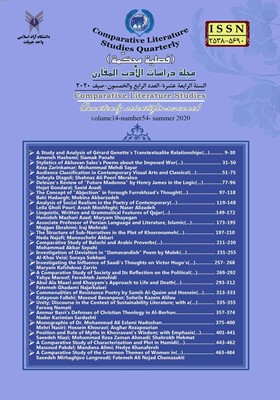Comparative Study of Baluchi and Arabic Proverbs
Subject Areas : شعر
1 - Assistant Professor, Velayat University
Keywords: مثل, proverb, Persian, فارسی, عربی, Baluchi, بلوچی, Arabic, مقایسه تطبیقی, comparative comparison,
Abstract :
Proverbs are important rituals and representations of human societies that represent human society, culture, and literature, their interests, tastes, and attitudes well. Baluchi language, literature and culture has always been in direct interaction with Persian language and literature, and on the other hand, Baluchi and other Iranian languages, dialects and subcultures, either directly, due to the position of Islam in this land or indirectly, due to Persian, which has been in closer interaction with Arabic have been influenced by proverbs and wise sayings and hadiths and narrations that have become proverb. In this article, we have tried to examine the prominent and remarkable examples of this type of proverbs and sayings that have become the form of proverb. One of the most important results in the middle of this research is the role of Persian language and literature. Regarding the commonalities of Baluchi and Arabic proverbs, most of the compatible examples of these two languages, the common example of them can also be found in Persian.
قرآن کریم. ترجمه مهدی الهی قمشهای.
بخاری، محمد بن اسماعیل. 1436ق، صحیح البخاری، بیروت: دار الفکر.
بهمنیار، احمد. 1381ش، داستاننامه بهمنیاری، تهران: انتشارات دانشگاه تهران.
جاحظ، عمرو بن بحر. 2002م، المحاسن والأضداد، با مقدمه علی بوملحم، بیروت: دار و مکتبة الهلال.
جهاندیده، عبدالغفور. 1396ش، فرهنگ بلوچی فارسی، چاپ اول، تهران: معین.
حقیقت، حسین شاه. 1388ش، خزینة الأمثال، ترجمه منتخب مجمع الامثال، به اهتمام احمد مجاهد، تهران: انتشارات دانشگاه تهران.
دولتی بخشان، عبدالعزیز. 1389ش، پیرانِ زمانگ: زن در آیینه مثل بلوچی، تهران: انتشارات مهر تابانِ تهران.
دهخدا، علیاکبر. 1386ش، امثال و حکم، چاپ چهاردهم، تهران: انتشارات امیرکبیر.
ذوالفقاری، حسن. 1388ش، فرهنگ بزرگ ضرب المثلهای ایرانی، تهران: معین.
رازی، محمد بن ابیبکر. 1394ش، امثال و حکم، ترجمه، تصحیح و توضیح فیروز حریرچی، چاپ پنجم، تهران: انتشارات دانشگاه تهران.
زنجانی، سید احمد. 1329ش، الکلام یجرُّ الکلام، قم: چاپخانه قم.
سپاهی، محمداکبر و اسحاق میربلوچزائی. 1391ش، ضرب المثلهای بلوچ، زاهدان: انتشارات تفتان.
سعدی، مصلحالدین. 1385ش، کلیات سعدی، تهران: هرمس.
عطار نیشابوری. 1388ش، الهی نامه عطار نیشابوری، مصحح: محمدرضا شفیعی کدکنی، تهران: انتشارات سخن.
غنیمی هلال، محمد. 1390ش، ادبیات تطبیقی، ترجمه سید مرتضی آیتاللهزاده شیرازی، تهران: امیرکبیر.
فروزانفر، بدیعالزمان. 1381ش، احادیث و قصص مثنوی، چاپ دوم، تهران: امیرکبیر.
کلینی، محمد بن یعقوب. 1342ش، الکافی، به تصحیح علی اکبر غفاری، جلد1، تهران: المکتبة الاسلامیه.
ملطیوی، محمد غازی. 1383ش، روضة العقول، به تصحیح و تحشیه محمد روشن و ابوالقاسم جلیلپور، تهران: فرهنگستان زبان و ادبیات فارسی.
مولوی، جلالالدین محمد. 1390ش، مثنوی معنوی، به تصحیح رینولد.ا. نیکلسون، چاپ پنجم، تهران: انتشارات هرمس.
میدانی، احمد بن محمد. 1366ش، مجمع الأمثال، جلد دوم، مشهد: آستان قدس رضوی.
ندا، طه. 1393ش، ادبیات تطبیقی، ترجمه هادی نظری منظم، چاپ سوم. تهران: نشر نی.
مقالات
جهاندیده، عبدالغفور. 1397ش، «نمادپردازی حیوانات در اصطلاحات و مثلهای بلوچی»، فصلنامه ادبیات و زبانهای ایران زمین، شماره 22، صص 74-41.
سیف، عبدالرضا و محمداکبر سپاهی و اسحاق میربلوچزایی. 1394ش، «مقایسه تطبیقی ضرب المثلهای بلوچی و فارسی»، بهار ادب، سال هشتم، شماره اول، شماره پیاپی 27، صص 392- 375.
_||_
Holy Quran. Translated by Mehdi Elahi Ghomshei.
Bokhari, Mohammad ibn Ismail. 1436 AH, Sahih al-Bokhari, Beirut: Dar al-Fekr.
Bahmanyar, Ahmad 2002, Bahmanyari's story, Tehran: University of Tehran Press.
Jahez, Amr bin Bahr. 2002, Al-Mahasin and Al-Azdad, with introduction by Ali Bumalham, Beirut: Dar and Maktab al-Helal.
Jahandideh, Abdul Ghafoor 2017, Baluchi Persian Culture, first edition, Tehran: Moein.
Haghighat, Hossein Shah. 2009, Treasury of Proverbs, selected translation of Proverbs, by Ahmad Mojahed, Tehran: University of Tehran Press.
Dolati Bakhshan, Abdul Aziz 2010, Piran Zemang: Woman in the Ritual Like a Baluchi, Tehran: Mehr Taban Publications, Tehran.
Dehkhoda, Ali Akbar. 2007, Proverbs and Verdicts, Fourteenth Edition, Tehran: Amirkabir Publications.
Zolfaghari, Hassan 2009, The Great Culture of Iranian Proverbs, Tehran: Moein.
Razi, Mohammad ibn Abi Bakr. 2015, Proverbs and Verdicts, translation, correction and explanation by Firooz Haririchi, fifth edition, Tehran: University of Tehran Press.
Zanjani, Seyed Ahmad 1950, Al-Kalam Yajra Al-Kalam, Qom: Qom Printing House.
Sepahi, Mohammad Akbar and Ishaq Mir Baloochzai. 2012, Baluch Proverbs, Zahedan: Taftan Publications.
Saadi, Moslehuddin. 2006, Saadi Generalities, Tehran: Hermes.
Attar Neyshaburi, 2009, Elahi Nameh of Attar Neyshabouri, Editor: Mohammad Reza Shafiei Kadkani, Tehran: Sokhan Publications.
Ghanimi Helal, Mohammad 2011, Comparative Literature, translated by Seyed Morteza Ayatollahzadeh Shirazi, Tehran: Amirkabir.
Forouzanfar, Badi'a al-Zaman. 2002, Masnavi Hadiths and Stories, Second Edition, Tehran: Amirkabir.
Klini, Muhammad ibn Ya'qub 1963, Al-Kafi, edited by Ali Akbar Ghaffari, Volume 1, Tehran: Islamic School.
Maltivi, Mohammad Ghazi 2004, Rozat Al-Aghul, edited by Mohammad Roshan and Abolghasem Jalilpour, Tehran: Academy of Persian Language and Literature.
Movlavi, Jalaluddin Mohammad 2011, Masnavi Manavi, corrected by Reynolds. Nicholson, Fifth Edition, Tehran: Hermes Publications.
Meidani, Ahmad bin Mohammad 1987, Assembly of Proverbs, Volume 2, Mashhad: Astan Quds Razavi.
Neda, Taha. 2014, Comparative Literature, translated by Hadi Nazari Monnazam, third edition. Tehran: Ney Publishing.
Articles
Jahandideh, Abdul Ghafoor 2018, "Symbolism of animals in Baluchi idioms and proverbs", Quarterly Journal of Iranian Literature and Languages, No. 22, pp. 74-41.
Seif, Abdolreza and Mohammad Akbar Sepahi and Ishaq Mirbaloochzaei. 2015, "Comparative comparison of Baluchi and Persian proverbs", Bahar Adab, eighth year, first issue, consecutive issue 27, pp. 392-395.


